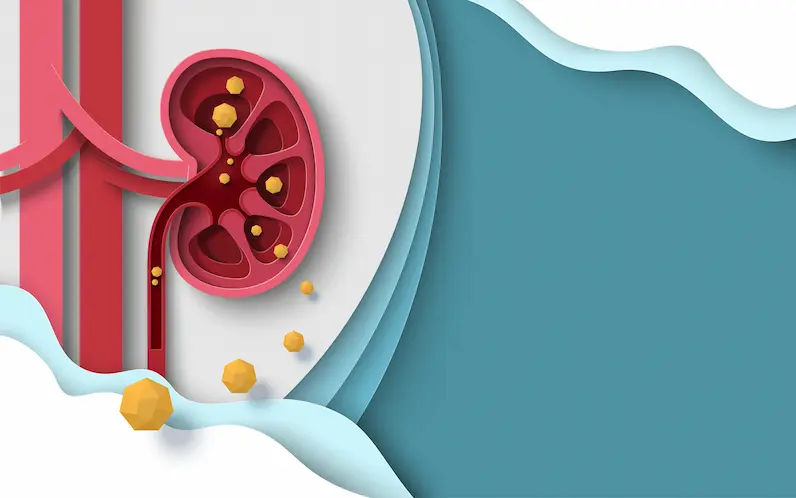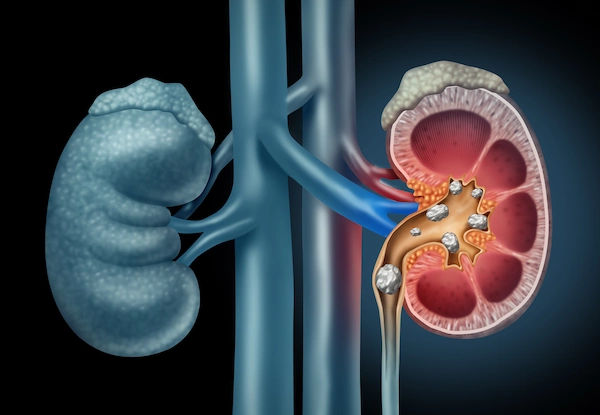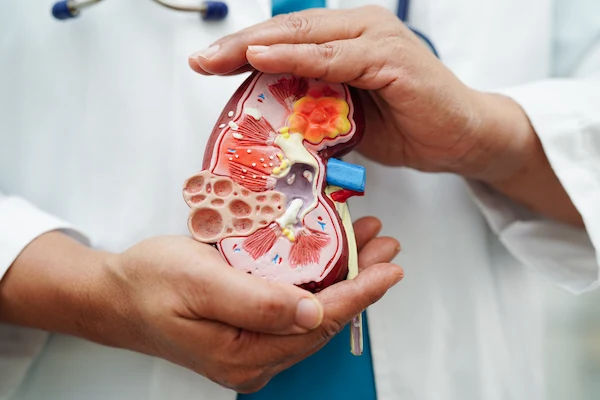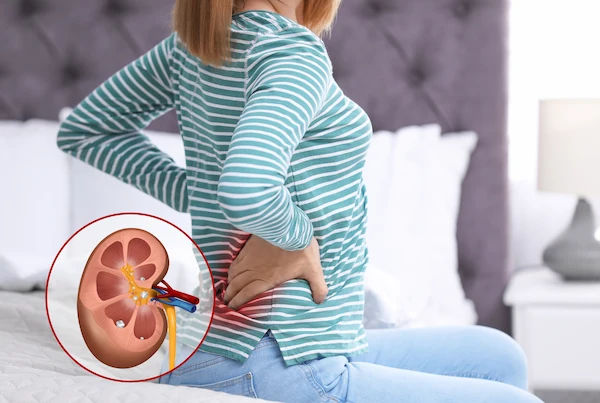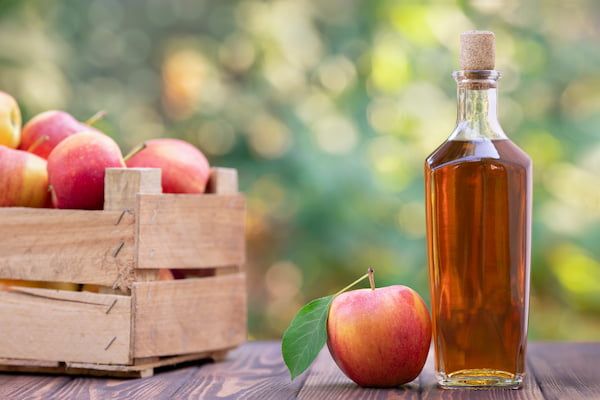What Leads to the Signs of Kidney Stones and Their Types
Kidney stones can cause sudden, severe pain and urinary symptoms. Learn what leads to the signs of kidney stones, how symptoms differ by stone location, the types of stones, diagnosis methods, treatments, and proven ways to prevent recurrence.

Written by Dr. J T Hema Pratima
Reviewed by Dr. Dhankecha Mayank Dineshbhai MBBS
Last updated on 13th Jan, 2026
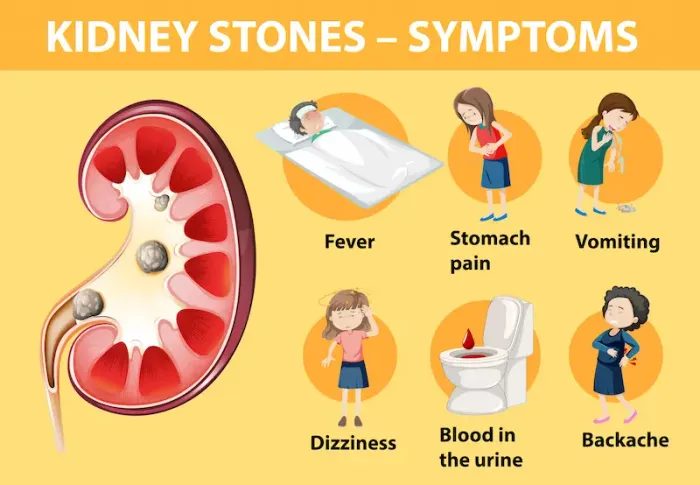
Introduction
A kidney stone may be tiny, but the pain it triggers can be unforgettable. Many people first notice sudden, sharp, wave-like pain radiating from the lower back to the groin — a classic sign of renal colic caused by a stone moving through the urinary tract. Kidney stones form when minerals and salts in concentrated urine stick together, creating hard deposits that can irritate or block the urinary system. While anyone can develop kidney stones, certain diets, medical conditions, medications, and family history significantly increase the risk.
This comprehensive guide explains how kidney stones form, what leads to the warning signs, the major stone types, and why identifying your type is critical for prevention. We also cover diagnosis, treatment choices — from supportive home care to advanced procedures — and practical strategies to avoid future stones. If pain lasts more than a couple of weeks or there are danger signals like fever, you can consult a doctor online with Apollo 24|7 for timely advice and treatment planning.Consult a Top Nephrologist for Personalised Advice
Understanding Kidney Stones: The Basics
Why do these deposits form in the kidneys and become painful when they move?
What is a kidney stone?
A kidney stone is a solid crystal mass that forms inside the kidneys when urine becomes highly concentrated with minerals like calcium, oxalate, or uric acid. Stones may stay silent in the kidney or trigger pain when they enter the ureter — the narrow tube that drains urine into the bladder.
How common are they?
Kidney stones are increasingly common worldwide. Hot climates, modern dietary habits, and rising obesity contribute to growing numbers, especially in adults aged 30–60. Once a person has had one stone, the chance of developing another is much higher without prevention.
How stones form: crystallisation explained
Healthy urine contains natural inhibitors that keep minerals dissolved. When urine becomes too concentrated — due to dehydration, high salt intake, or metabolic tendencies — crystals form, stick together, and slowly grow into stones.
Signs and Symptoms: How Kidney Stone Pain Presents
Recognising the early signs helps prevent dangerous complications.
Renal colic: the hallmark
Most people first feel sudden, intense flank pain that may travel toward the groin. The pain comes in waves as the ureter muscles spasm around the stone. Patients often can’t sit still and may appear extremely distressed.
Other symptoms
• Pink or red urine (due to blood)
• Burning or difficulty urinating
• Nausea or vomiting
• Frequent urge to urinate, especially when the stone is near the bladder
• Cloudy or smelly urine if infection is present
Red flags requiring urgent care
Get emergency help if you experience:
• Fever and chills
• Severe, unrelenting pain
• Vomiting preventing hydration
• Weakness or signs of infection spreading. A stone with an infection can rapidly become life-threatening.
If symptoms continue beyond two weeks or the diagnosis is unclear, consult a doctor online with Apollo 24|7.
Causes and Risk Factors You Can and Can’t Control
Multiple factors — lifestyle, metabolic issues, and genetics — influence stone risk.
Metabolic causes
Most stones contain calcium. High urinary calcium, low urinary citrate, or excess oxalate increases the likelihood of crystal formation. Uric acid stones are more common in people with acidic urine or gout.
Diet and behaviour
• Not drinking enough water
• High-salt diets (increase urinary calcium)
• Frequent consumption of animal protein (acidifies urine)
• Low dietary calcium (less binding of oxalate in the gut)
Medical conditions
Common contributing conditions:
• Obesity, diabetes, gout
• Inflammatory bowel disease
• Hyperparathyroidism
• Recurrent urinary tract infections
Certain medications like loop diuretics, topiramate, or high-dose vitamin C may raise stone risk.
Genes and family history
If a parent or sibling has kidney stones, your risk is markedly higher. Rare genetic disorders like cystinuria cause stones from a young age.
Types of Kidney Stones and Why They Matter
Understanding your stone type allows precise, targeted prevention.
Calcium oxalate
• Most common type
• Triggered by dehydration, high oxalate foods (spinach, almonds), low citrate
• Prevention: increased hydration, reduced salt, adequate dietary calcium
Calcium phosphate
• Form in alkaline urine
• Linked with metabolic disorders such as renal tubular acidosis
• Requires evaluation for underlying causes
Uric acid
• Develop when urine is too acidic
• Common in gout and high-purine diets
• Prevention: alkalinising urine (lemon/lime water or prescribed citrate), dietary modification
Struvite (infection) stones
• Caused by bacteria that alter urine chemistry
• Grow rapidly and may form large “staghorn” shapes
• Require infection control and often surgery
Cystine stones
• Result of a genetic disorder
• Require high fluid intake and specialised treatment
Mixed stones
Many stones contain a combination of minerals — another reason stone testing is essential.
How Doctors Diagnose Kidney Stones
Accurate diagnosis guides quick relief and prevents complications.
Clinical assessment
Doctors consider history, pain characteristics, fever, and risk factors.
Urinalysis and blood tests
Urine is checked for blood, white cells, nitrites, pH, and crystals. Blood tests evaluate kidney function and stone-associated minerals like calcium and uric acid. Apollo 24|7 offers convenient home sample collection for many of these tests.
Imaging
• Non-contrast CT scan: best accuracy, quick diagnosis
• Ultrasound: preferred in pregnancy and can detect swelling
• X-ray (KUB): may help track certain stones over time
Stone analysis.
Patients are advised to strain urine to collect passed stones. Lab analysis reveals their type and prevention needs.
When a Kidney Stone Needs Treatment Now
Timing matters — delay can worsen kidney damage.
Stone size and urgency
Many stones under 5 mm pass naturally. Stones over 10 mm often require intervention, especially if blocking the ureter.
Initial management
• NSAIDs for pain
• Hydration
• Anti-nausea medication
An alpha-blocker like tamsulosin may help certain stones pass more easily.
When to consult a doctor with Apollo 24|7
• Pain lasting longer than 1–2 weeks
• Persistent vomiting
• Fever or suspected infection
• Underlying kidney disease or a single kidney
Procedures to Remove Kidney Stones: What to Expect
Modern techniques are highly effective and recovery is often quick.
Shock wave lithotripsy (SWL)
Focused sound waves break stones into fragments that pass naturally. Ideal for many stones under 2 cm.
Ureteroscopy with laser
A thin scope accesses the ureter or kidney to break and remove stones. Frequently used for hard-to-reach stones.
Percutaneous nephrolithotomy (PCNL)
A minimally invasive keyhole procedure for very large stones or staghorn calculi, allowing direct removal.
Temporary stents
Placing a catheter to keep urine flowing after procedures may cause frequency or discomfort but are essential for healing.
Preventing New Stones: The Strategies That Work
Effective prevention focuses on hydration and mineral balance.
Hydration
Aim for 2–2.5 litres of urine daily (usually 2.5–3 litres fluid intake), more in hot climates.
Tips:
• Carry a refillable bottle
• Check urine colour (pale straw = ideal)
• Hydrate during exercise and travel
Sodium, protein, and calcium balance
• Keep salt low
• Moderate animal protein intake
• Ensure adequate calcium from food sources (e.g., dairy)
Oxalate-rich foods
Limit very high-oxalate foods if prone to calcium oxalate stones. Pair leafy greens with calcium-rich foods to reduce absorption.
Citrate boost
Lemon or lime water supports natural stone-inhibiting citrate levels.
Medications Tailored to Stone Type
Pharmacotherapy is targeted based on risk profile.
• Thiazide diuretics reduce urinary calcium
• Potassium citrate raises citrate and pH
• Allopurinol helps with high uric acid and gout
• Antibiotics are required for infection-driven stones
• Specialist medicines may be needed for cystinuria
Special Situations: Children, Pregnancy, and Single Kidneys
Certain groups require specific care to avoid complications.
• Children may need metabolic testing early to prevent recurrence
• Ultrasound is preferred in pregnancy to avoid radiation
• Any obstruction in a single kidney is treated urgently
Conditions That Mimic Stones and Complications
Other abdominal emergencies can produce similar symptoms.
• Appendicitis
• Gallstones
• Musculoskeletal back pain
Potential complications of untreated stones:
• Recurrent UTIs
• Kidney swelling (hydronephrosis)
• Permanent kidney damage
What To Do After Passing a Stone
Follow-up prevents future stones.
• Collect the stone for analysis
• Ask your doctor about a 24-hour urine test
• Review imaging to confirm stone clearance
• Build consistency with hydration and diet strategies
• Use Apollo 24|7 for guidance and home-collected tests
Resources and When to Seek Help
Quick access to care keeps risks low.
If pain worsens, fever develops, or symptoms persist despite treatment, consult a doctor with Apollo 24|7 for rapid evaluation and tailored therapy.
Conclusion
Kidney stones are a leading cause of intense abdominal and flank pain worldwide. The pain usually arises when a stone moves into the ureter, causing a temporary blockage. Understanding what leads to these symptoms — concentrated urine, metabolic tendencies, high salt intake, or certain health conditions — is key to avoiding future episodes. Early recognition of warning signs such as blood in urine, nausea, or persistent urinary urgency can ensure prompt treatment and prevent dangerous complications like infection and kidney damage.
Identifying the specific type of kidney stone provides valuable insight into what changes will help most. Calcium stones, for example, respond well to higher fluid intake, reduced salt, and balanced dietary calcium. Uric acid stones often require alkalinisation of urine, while infection stones need targeted therapy and sometimes surgery. If a stone passes, laboratory analysis and metabolic testing allow doctors to create a personalised plan for long-term prevention.
Lifestyle changes — especially hydration and diet — have a powerful impact. Backed by medical guidance and follow-up, these strategies can significantly lower recurrence risk. If you experience strong pain, fever, vomiting, or symptoms that do not improve, a timely consultation can make all the difference. Apollo 24|7 offers access to specialists, diagnostic support, and personalised kidney stone care so you can move forward with confidence and comfort.Consult a Top Nephrologist for Personalised Advice
Consult a Top Nephrologist for Personalised Advice

Dr. Manju Kamal
Nephrologist
12 Years • MBBS,MD(General Medicine), DNB,DM(Nephrology)
Angamaly
Apollo Hospitals Karukutty, Angamaly

Dr. Pardha Saradhi
Nephrologist
9 Years • MBBS, MD-DNB (Gen. Med.), DNB (Nephro)
Hyderabad
Apollo Hospitals D R D O kanchanbagh, Hyderabad
(75+ Patients)

Dr. Aswini Kumar Panigrahi
Nephrologist
23 Years • MBBS, MD (Int. Med.), DNB Nephro
Hyderabad
Apollo Hospitals Jubilee Hills, Hyderabad
(225+ Patients)

Dr. Sunil Jawale
Nephrologist
17 Years • MBBS, MD (Internal Medicine), DM (Nephrology)
Pune
Apollo Hospitals Pune, Pune

Dr Gopambuj Singh Rathod
Nephrologist
5 Years • MD (Internal Medicine), DM (Nephrology)
Lucknow
Apollomedics Super Speciality Hospital, Lucknow
Consult a Top Nephrologist for Personalised Advice

Dr. Manju Kamal
Nephrologist
12 Years • MBBS,MD(General Medicine), DNB,DM(Nephrology)
Angamaly
Apollo Hospitals Karukutty, Angamaly

Dr. Pardha Saradhi
Nephrologist
9 Years • MBBS, MD-DNB (Gen. Med.), DNB (Nephro)
Hyderabad
Apollo Hospitals D R D O kanchanbagh, Hyderabad
(75+ Patients)

Dr. Aswini Kumar Panigrahi
Nephrologist
23 Years • MBBS, MD (Int. Med.), DNB Nephro
Hyderabad
Apollo Hospitals Jubilee Hills, Hyderabad
(225+ Patients)

Dr. Sunil Jawale
Nephrologist
17 Years • MBBS, MD (Internal Medicine), DM (Nephrology)
Pune
Apollo Hospitals Pune, Pune

Dr Gopambuj Singh Rathod
Nephrologist
5 Years • MD (Internal Medicine), DM (Nephrology)
Lucknow
Apollomedics Super Speciality Hospital, Lucknow
